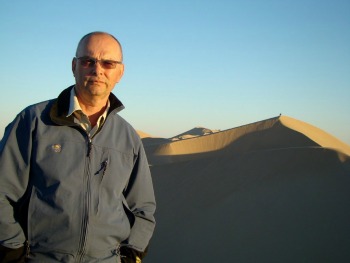
Dr. Gordon Walker takes his leisure seriously. He's seen here on a trip to the Gobi Desert - one of many locales in the world he's visited.
Do people in China think about leisure the same way North Americans do? Do men and women perceive leisure differently, or is all leisure positive? And how do you know if you're experiencing leisure at all? Leisure professor Dr. Gordon Walker can answer all of those questions - and more. After all, he's written the book on it.
Walker is co-author with Douglas Kleiber (University of Georgia) and Roger Mannell (University of Waterloo) of "A Social Psychology of Leisure," one of the most cited textbooks on the subject. First published in 1997, and with the second edition hot off the press, Walker says the book gives undergraduate students and graduate students new to the subject, a multi-faceted foundational text looking at leisure from many angles, including psychological, socio-cultural, anthropological and environmental aspects.
"This book draws the connection between the socio-cultural aspects of leisure and the psychology of leisure," says Walker.
One of the purposes of the second edition, says Walker, is to give practitioners the tools to be effective advocates for leisure's considerable benefits for health and well-being in their communities. "To be a good practitioner, you have to understand the concepts and theories, and the benefits. Leisure practitioners must be able to answer, 'Why are we doing this?' he says. "I call it the 'Swimming pool vs. Pothole' theory. So, when City Council is looking to cut costs they're more likely to cut the swimming pool. Practitioners need to be able to justify why keeping the pool is more important than fixing potholes and make a case for the swimming pool's contribution to health and well-being and importance in terms of community. Understanding the fundamentals of leisure will help them do that."
Also there's more curiosity today, with burgeoning immigration to OECD (Organisation for Economic Co-operation and Development) member countries - over four million in 2009 alone - about how others appreciate and engage in leisure, and this is a new addition to the book, says Walker, whose own research focuses on the leisure experiences of Chinese-Canadians and Mainland Chinese people.
"Since the first edition in 1997, the world has changed considerably," he says. "Because of migration, for example, countries are looking at the factors that attract and retain immigrants and help them to integrate. Not surprisingly, leisure is one of those."
Consequently culture also plays a significant role in leisure activities, says Walker, citing his experience of presenting at Beijing Sport University where scholars told him that the North American concept of 'work hard, play hard' didn't make sense to them. "They said the Chinese concept is to work hard and rest easy, so leisure, generally speaking, is more quiet, restful, recuperative and contemplative."
There's much to intrigue students in the text. Some of the highlight chapters include cultural and gender differences and similarities in leisure, leisure needs, motivations and constraints to leisure, leisure experiences, personality and leisure; race, ethnicity, culture and leisure, and cultivating leisure.
The new edition takes a timely look at older adults and leisure and the new phenomenon of 'emerging adulthood.'
Explains Walker, "The term 'teenager' didn't exist until the '40's. You used to go from being in elementary school to being a productive worker; adolescence didn't exist as we know it and you were often married by 18 and had kids shortly thereafter. Now that period is stretching out. Today, offspring of 18 - 30, may still be living at home and not married. Leisure time for this group is a time to experiment, try on new identities, and figure out who and what they want to be. Leisure is that freedom and opportunity to try all of those things."
Walker says the book will also be helpful in stimulating thought and pointing both researchers and practitioners in directions they may not have considered before. "The book synthesizes all of the information about leisure; there are a huge number of references, so you might find an area or an article you hadn't thought about."
For Walker, who admits to taking his own leisure "very seriously," the effort put into the new book has been worth the work. "It's really quite an honour to have contributed to a book that helps to shape the field, research-wise."